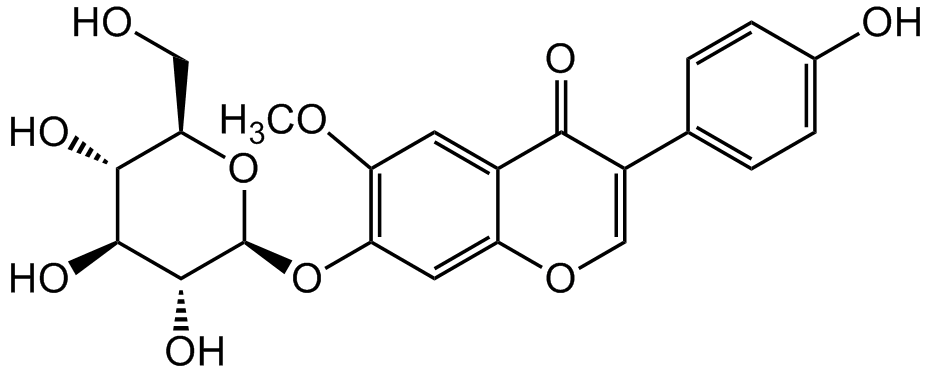Glycitin
Product Code:
CDX-G0136
CDX-G0136
Host Type:
Plant
Plant
Regulatory Status:
RUO
RUO
Shipping:
AMBIENT
AMBIENT
Storage:
+20°C
+20°C
No additional charges, what you see is what you pay! *
| Code | Size | Price |
|---|
| CDX-G0136-M025 | 25 mg | £291.00 |
Quantity:
Prices exclude any Taxes / VAT
Stay in control of your spending. These prices have no additional charges, not even shipping!
* Rare exceptions are clearly labelled (only 0.14% of items!).
* Rare exceptions are clearly labelled (only 0.14% of items!).
Multibuy discounts available! Contact us to find what you can save.
This product comes from: Switzerland.
Typical lead time: 7-10 working days.
Contact us for more accurate information.
Typical lead time: 7-10 working days.
Contact us for more accurate information.
- Further Information
- Documents
- References
- Show All
Further Information
Alternate Names/Synonyms:
7-(beta-D-Glucopyranosyloxy)-3-(4-hydroxyphenyl)-6-methoxy-4H-1-benzopyran-4-one; Glycitein-7-beta-O-glucoside
Appearance:
White powder.
CAS:
40246-10-4
EClass:
32160000
Form (Short):
solid
Handling Advice:
Protect from light and moisture.
InChi:
InChI=1S/C22H22O10/c1-29-15-6-12-14(30-9-13(18(12)25)10-2-4-11(24)5-3-10)7-16(15)31-22-21(28)20(27)19(26)17(8-23)32-22/h2-7,9,17,19-24,26-28H,8H2,1H3/t17-,19-,20+,21-,22-/m1/s1
InChiKey:
OZBAVEKZGSOMOJ-MIUGBVLSSA-N
Long Description:
Chemical. CAS: 40246-10-4. Formula: C22H22O10. MW: 446.40. Glycitin is a natural isoflavone isolated from legumes, including soy and kudzu. It has been reported to have multiply biological functions, such as anti-inflammatory, antioxidant, antiobesity, anticardiovascular activity and promoting wound healing. Like other isoflavones, glycitin promotes the proliferation of bone marrow stromal cells and osteoblasts and suppresses bone turnover. Glycitin can be modified by the action of beta-glucosidases into the metabolite glycitein which has anti-inflammatory properties.
MDL:
MFCD00800711
Molecular Formula:
C22H22O10
Molecular Weight:
446.4
Package Type:
Vial
Product Description:
Glycitin is a natural isoflavone isolated from legumes, including soy and kudzu. It has been reported to have multiply biological functions, such as anti-inflammatory, antioxidant, antiobesity, anticardiovascular activity and promoting wound healing. Like other isoflavones, glycitin promotes the proliferation of bone marrow stromal cells and osteoblasts and suppresses bone turnover. Glycitin can be modified by the action of beta-glucosidases into the metabolite glycitein which has anti-inflammatory properties.
Purity:
>98% (HPLC)
SMILES:
OC(C=C1)=CC=C1C2=COC3=CC(O[C@@H]4O[C@H](CO)[C@@H](O)[C@H](O)[C@H]4O)=C(OC)C=C3C2=O
Solubility Chemicals:
Soluble in DMSO (20mg/ml) or DMF (20mg/ml).
Source / Host:
Plant
Transportation:
Non-hazardous
UNSPSC Category:
Natural Products/Extracts
UNSPSC Number:
12352200
Use & Stability:
Stable for at least 2 years after receipt when stored at RT.
Documents
References
(1) T. Uesugi, et al.; Biol. Pharm. Bull. 24, 368 (2001) | (2) X.H. Li, et al.; Acta Pharmacol. Sin. 26, 1081 (2005) | (3) Y. Zang, et al.; Biosci. Biotechnol. Biochem. 79, 117 (2015) | (4) Y.M. Kim, et al.; Phytother. Res. 29, 757 (2015) | (5) L. Zhang, et al.; Exp. Ther. Med. 12, 3063 (2016) | (6) G.Y. Seo, et al.; Exp. Mol. Med. 49, e302 (2017) | (7) Y. Chen, et al.; Int. Immunopharmacol. 75, 105749 (2019)



